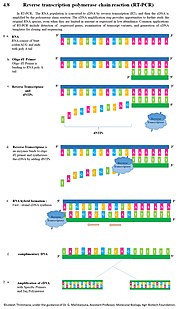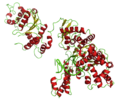A real-time polymerase chain reaction (real-time PCR, or qPCR when used quantitatively) is a laboratory technique of molecular biology based on the polymerase...
43 KB (5,346 words) - 03:57, 30 October 2024
Reverse transcription polymerase chain reaction (redirect from Reverse Transcriptase quantitative PCR)
technique called real-time PCR or quantitative PCR (qPCR). Confusion can arise because some authors use the acronym RT-PCR to denote real-time PCR. In this article...
44 KB (5,656 words) - 23:37, 29 October 2024
real time PCR with the use of allele specific probes. insertions and deletions are analyzed by dosage measurements using quantitative real time PCR.[citation...
51 KB (5,952 words) - 11:31, 30 October 2024
A quantitative PCR instrument is a machine that amplifies and detects DNA. It combines the functions of a thermal cycler and a fluorimeter, enabling the...
10 KB (1,008 words) - 19:36, 1 May 2024
Digital polymerase chain reaction (redirect from Digital PCR)
PCR inhibitors or primer template mismatch. Real-time Digital PCR (rdPCR) combines the methodologies of digital PCR (dPCR) and quantitative PCR (qPCR)...
69 KB (7,351 words) - 04:46, 30 October 2024
Polymerase chain reaction (redirect from PCR oil)
qPCR is the appropriate contractions for quantitative PCR (real-time PCR). Reverse Complement PCR (RC-PCR): Allows the addition of functional domains...
89 KB (11,135 words) - 05:58, 8 November 2024
Publication of Quantitative Real-Time PCR Experiments (MIQE) guidelines are a set of protocols for conducting and reporting quantitative real-time PCR experiments...
20 KB (2,673 words) - 11:49, 9 July 2024
the U.S. are performing screening for SCID in newborns using real-time quantitative PCR to measure the concentration of T-cell receptor excision circles...
34 KB (3,270 words) - 01:33, 14 August 2024
distance between the primer and the probe in some forms of real-time quantitative PCR (qPCR). The error rates of various polymerases (fidelity) have been...
41 KB (5,164 words) - 23:57, 28 July 2024
hydrolysis probes that are designed to increase the specificity of quantitative PCR. The method was first reported in 1991 by researcher Kary Mullis at...
6 KB (684 words) - 02:15, 23 December 2023





